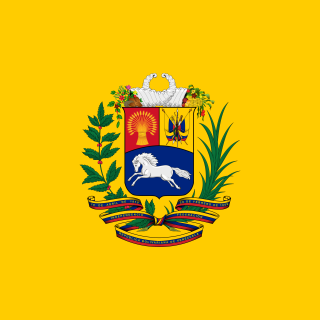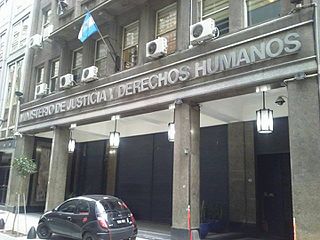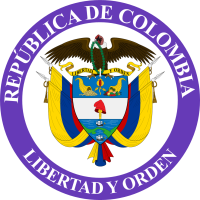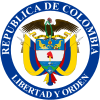
The politics of Ecuador are multi-party. The central government polity is a quadrennially elected presidential, unicameral representative democracy. The President of Ecuador is head of state and head of the army on a multi-party system, and leads a cabinet with further executive power. Legislative power is not limited to the National Assembly, as it may to a lesser degree be exercised by the executive which consists of the President convening an appointed executive cabinet. Subsequent acts of the National Assembly are supreme over Executive Orders where sufficient votes have been cast by the legislators. The judiciary is independent of the executive and the legislature. Ecuador is also considered a constitutional republic.

The Panamanian Public Forces are the national security forces of Panama. Panama is the second country in Latin America to abolish its standing army, with Panama retaining a small paramilitary security force. This came as a result of a U.S. invasion that overthrew a military dictatorship which ruled Panama from 1968 to 1989. The final military dictator, Manuel Noriega, had been belligerent toward the U.S. culminating in the killing of a U.S. Marine lieutenant and U.S. invasion ordered by U.S. President George H. W. Bush.

The President of Colombia is the head of state and head of government of the Republic of Colombia. The president heads the executive branch of the national government and is the commander-in-chief of the Military Forces of Colombia.

The Political Constitution of Colombia of 1991, is the Constitution of the Republic of Colombia. It was promulgated in Constitutional Gazette number 114 on Thursday, July 4, 1991, and is also known as the Constitution of Human Rights. It replaced the Political Constitution of 1886 and was issued during the presidency of the liberal César Gaviria, with ideas from the also liberal Luis Carlos Galán.

The Administrative Department of Security was the security service agency of Colombia, which was also responsible for border and immigration services. It was dissolved on 31 October 2011 as part of a wider Executive Reform, and was replaced by the Dirección Nacional de Inteligencia (DNI).

The Cabinet of Ministers of Venezuela (Spanish: Gabinete de Ministros de Venezuela is one of the bodies that make up the Venezuelan executive in that country's presidential system, alongside the Council of Ministers. The Cabinet is headed by the president of Venezuela, and his corresponding vice president. The purpose of the ministries is to create, adopt, follow and evaluate policies, strategies, programs and projects in accordance with the constitution and the laws of the republic.

The president of Venezuela, officially known as the President of the Bolivarian Republic of Venezuela, is the head of state and head of government in Venezuela. The president leads the National Executive of the Venezuelan government and is the commander-in-chief of the National Bolivarian Armed Forces. Presidential terms were set at six years with the adoption of the 1999 Constitution of Venezuela, and presidential term limits were removed in 2009.

Nicaragua is a country in Central America with constitutional democracy with executive, legislative, judicial, and electoral branches of government. The President of Nicaragua is both head of state and head of government. Executive power is exercised by the government.

The Ministry of the Interior (MIR) is a department of the Government of Spain responsible for public security, the protection of the constitutional rights, the command of the law enforcement agencies, national security, immigration affairs, prisons, civil defense and road traffic safety. Through the Undersecretariat of the Interior and its superior body, the Directorate-General for Internal Policy, the Ministry is responsible for all actions related to ensuring political pluralism and the proper functioning of electoral processes.

The Mexican Secretariat of Public Security or Secretariat of Public Safety, also known as Ministry of Public Security and Ministry of Public Safety, was the federal ministry of the Mexican Executive Cabinet that aimed to preserve freedom, order, and public peace and safeguard the integrity and rights of the people. The Assistant Attorney General uses the Powers of the Union to prevent the commission of crimes, develop public security policies of the Federal Executive, propose policies on crime, administer the federal prison system, and administer justice to juvenile offenders based on the Organic Law of the Federal Public Administration and other federal laws, regulations, decrees, agreements, and orders of the President of the Republic. It had its headquarters in Álvaro Obregón, Mexico City.

The National Penitentiary Institute of Peru is the government agency charged with incarcerating convicts and suspects charged with crimes. It is part of the Peruvian government's Ministry of Justice.
National Penitentiary Institute may refer to:

The National Penitentiary and Prison Institute, INPEC, is the Colombian central government agency responsible for the incarceration and rehabilitation of convicted criminal offenders, and administration of the penitentiary institutions in the country

Fernando Carrillo Flórez is a Pontifical Xavierian University educated lawyer and economist, with postgraduate studies from Harvard University. He served as Colombia's 11th Minister of the Interior from 2012 to 2013, and 55th Minister of Justice from 1991 to 1992.

The Ministry of Justice of Argentina is a ministry of the national executive power tasked with enforcing of the law and administration of justice.
Jean Alain Rodríguez Sánchez is a Dominican lawyer and politician former Attorney General of the Dominican Republic. He was appointed to the position of President Danilo Medina. Before becoming Attorney General, Rodríguez Sánchez served as the executive director of the CEI-RD (2012-2016). He is a member of the Central Committee of the Dominican Liberation Party, the previous governing political party in Dominican Republic until August 16, 2020.
The Litoral Penitentiary, known officially as Center for Social Rehabilitation of Men No. 1 of Guayaquil is the largest prison in Ecuador. It is located 16.5 km (10.3 mi) from Vía a Daule, on the outskirts of Guayaquil. The prison has twelve pavilions and has a capacity of five thousand inmates, although by July 2021 it housed around ten thousand. It is part of the Guayas Penitentiary Complex, which also includes the Guayas Regional Rehabilitation Center, La Roca Prison and the Provisional Detention Center.














